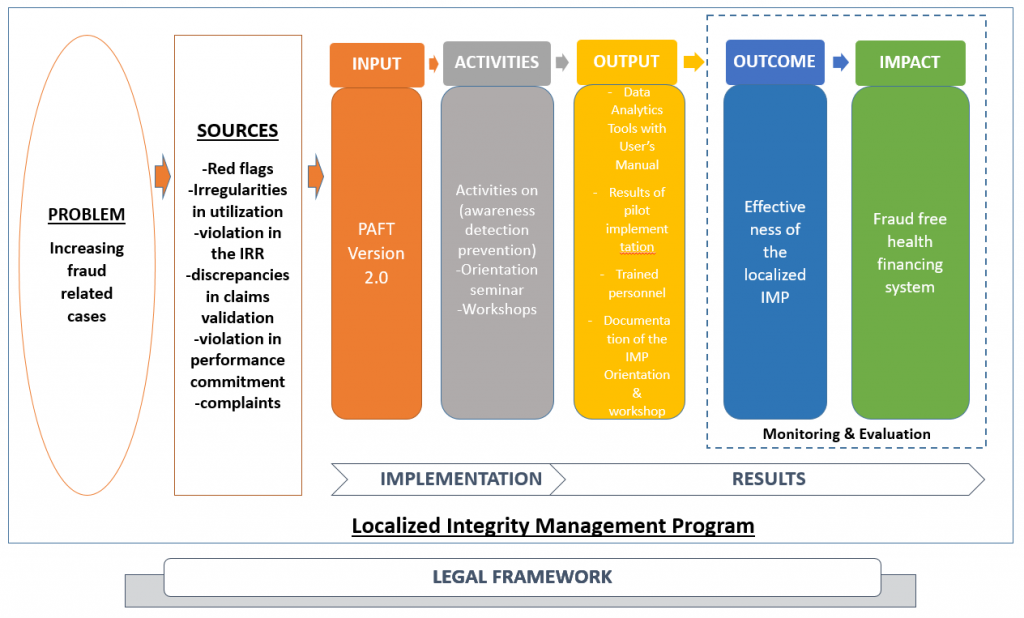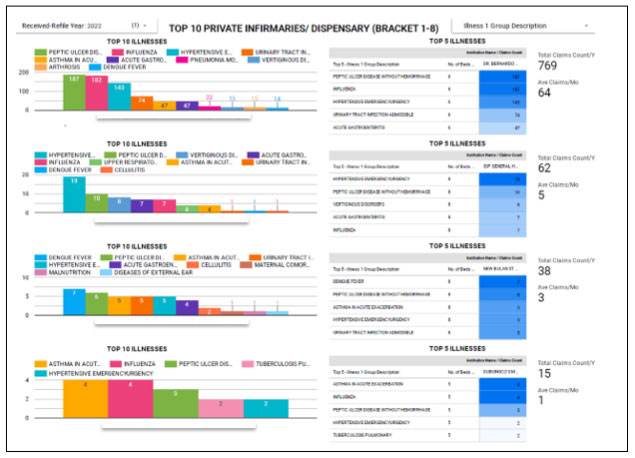Themes
Regulatory Reform: The program aims to improve regulatory quality by detecting and preventing fraud, which can obstruct competition, innovation, and growth in healthcare institutions. Integrity management implemented with data analytics addresses regulatory shortcomings and ensures that regulations efficiently serve important social objectives.
Service Quality: While the primary focus is on regulatory reform, the program indirectly contributes to service quality by enhancing the integrity and reliability of healthcare services. By preventing fraud, it promotes service excellence and continuous incremental improvements in the quality of healthcare services offered by public-sector organizations.
Overview
This case study focuses on combating fraud in healthcare institutions (HCIs) through a localized Integrity Management Program (IMP) using data analytics. The main challenge lies in the increasing fraud cases within HCIs, with the Bicol region receiving a total of 2,305 cases from 2018 to 2022. Although the volume of cases decreased starting in 2020, the percentage of fraud cases per year revealed an upward trend from 21% in 2020 to 68% in 2022. Nationally, the number of fraud cases under investigation rose significantly—by 36% from 2020 to 2021, and 53% from 2021 to 2022. The solution involves implementing a bottom-up IMP, comprising data analytics training and orientation seminars, to empower employees and detect potential fraud activities. Through data analytics, the program transforms evidence into actionable measures, effectively addressing fraud concerns. This initiative not only enhances integrity awareness but also fosters good governance and restores public trust in healthcare financing systems.

Challenge
Fraud within HCIs drains resources, undermines healthcare quality and accessibility, and erodes public trust in the system. The traditional approach to fraud detection relies on random hospital visits and data provided by the head office, which often proves to be inefficient and inadequate. This manual method is not only time-consuming but also reactive, making it difficult to effectively identify and address fraudulent activities. Detecting and preventing fraud is crucial for optimizing resource allocation and ensuring that members’ premium contributions are used efficiently to provide quality healthcare. Legal Researcher Philia Joy N. Gaitana shares the limitations and challenges of this traditional approach to fraud investigation, highlighting the need for improved methods.
Solution
The Localization of IMP Using Data Analytics to Detect and Prevent Fraud in Health Care Institutions addresses the challenge of fraud in HCIs by implementing a multifaceted approach. It recognizes the need for targeted intervention at the regional level, acknowledging that fraud issues can vary between different areas. By focusing on PhilHealth Regional Office V, the program tailors its strategies to address specific challenges within the region, ensuring relevance and effectiveness. Since the project proponent hails from the same area, she can pilot this initiative within her jurisdiction. Second, the program integrates data analytics as a central tool for fraud detection and prevention. Leveraging quantitative and qualitative data it enables proactive identification of potential fraudulent activities, enhancing the efficiency and accuracy of fraud detection processes. Furthermore, the Localization of IMP follows a phased implementation approach, starting with localized IMP and extending to Corruption Risk Management and Internal Audit. This structured progression ensures a comprehensive anti-fraud framework, covering various aspects of fraud prevention within HCIs. Special Investigator and Capstone Project Proponent Ma. Theresa B. Eva shares the relevance of the use of data analytics in fraud detection.
The Localization of IMP offers innovative solutions to combat fraud in healthcare institutions (HCIs) by incorporating several key features
Tailored Approach: The program adopts a bottom-up strategy, focusing on PRO V to address specific regional challenges rather than a one-size-fits-all approach. This customization ensures interventions are relevant and effective, enhancing the program’s impact.

Data Analytics Integration: By leveraging data analytics, the program can proactively detect and prevent fraudulent activities in HCIs. This innovative use of technology allows for the analysis of both quantitative and qualitative data, providing deeper insights into potential fraud risks.

Phased Implementation: The program follows a phased approach, starting with the Localization of IMP and extending to Corruption Risk Management and Internal Audit. This structured progression ensures a comprehensive anti-fraud framework, laying the foundation for sustainable fraud prevention measures.

Figure 4. Phases of the Proposed Integrity Management Program in PhilHealth
Sustainability Measures: To ensure long-term effectiveness, the program incorporates sustainability measures such as Corporate Personnel Orders and ongoing updates to adapt to evolving fraud behaviors. These mechanisms enable continuous improvement and adaptation to changing circumstances.

Stakeholder Engagement: The program emphasizes collaboration with stakeholders, including healthcare institutions and external partners, fostering a collective effort to combat fraud. This inclusive approach promotes transparency, accountability, and trust, essential elements in effective fraud prevention strategies.

The program’s solutions combine targeted regional interventions, data analytics integration, and phased implementation to effectively address the challenge of fraud in healthcare institutions. By utilizing innovative strategies and technologies, it aims to enhance transparency, accountability, and integrity within the public sector, ultimately fostering good governance and restoring public trust.
Productivity Gains, Outcomes, and Impact
The Localization of IMP Using Data Analytics to Detect and Prevent Fraud in Health Care Institutions demonstrated significant productivity gains and outcomes, with the Implementation Team identifying 24 HCIs with irregularities in utilization, achieving a 21% fraud detection rate from zero prior to the data analytics training. A focused group discussion highlighted the importance and potential of Power BI in aiding investigation activities despite initial challenges. The Localized IMP Orientation Seminar significantly improved awareness and knowledge of integrity management among participants, with pre-test and post-test scores increasing from 7 to 9 on average. Regional Vice President Alberto C. Mandurriao shares the improvements in fraud detection using data analytics.
One key outcome of the intervention is the significant improvement in the detection of potential fraud behaviors in HCIs. Before the implementation of the program, the PhilHealth Region V office lacked the capacity to detect irregularities in healthcare claims effectively. However, after the Data Analytics Training and implementation of the IMP, the team was able to identify 24 HCIs with irregularities in utilization through data analytics and assessment processes. This improvement indicates a more efficient use of resources in detecting and preventing fraudulent activities, enhancing the productivity performance of the Philippine Health Insurance Corporation (PhilHealth)
Moreover, the intervention positively impacted the knowledge and awareness levels of PRO V employees regarding integrity management. The Localized IMP Orientation Seminar led to significant differences in test scores among participants, indicating an increase in awareness and understanding of the IMP. This improved knowledge can lead to better decision-making processes, increased integrity, and enhanced productivity among employees.
The use of data analytics as a major tool for fraud detection and prevention is an innovative feature of the program. By leveraging quantitative and qualitative data, PhilHealth Region V was able to proactively identify potential fraud behaviors and allocate resources more effectively. Additionally, the localization of the IMP tailored the intervention to the specific needs and challenges of the Bicol region, demonstrating a strategic and targeted approach to addressing fraud in healthcare institutions.
The Localization of IMP Using Data Analytics to Detect and Prevent Fraud in Health Care Institutions achieved measurable productivity gains by improving fraud detection rates, enhancing employee knowledge and awareness, and leveraging innovative tools and strategies. These outcomes positively impact the productivity performance of PhilHealth Region V and contribute to the overall integrity and efficiency of healthcare services in the Bicol region, benefiting both the organization and its stakeholders.
Lessons Learned/Challenges in Implementing the Intervention
The implementation of the localized Integrity Management Program (IMP) using data analytics presented several challenges and areas for improvement. Despite these challenges, the project was deemed a success. However, there are potential areas for enhancement, with the data analytics process being more efficient by exploring additional tools that can streamline data transformation into visual representations and reporting tools. This could have potentially reduced the complexity and time required for generating reports.
Furthermore, budgetary constraints posed significant challenges throughout the project. Securing sufficient funding from the onset would have alleviated many of the challenges encountered during the implementation phase. Adequate funding is crucial for the smooth execution of projects and ensuring the availability of resources necessary for success.
In summary, while the localized IMP using data analytics achieved its objectives, there are valuable lessons learned and opportunities for improvement. Streamlining processes, simplifying documentation, extending training durations, and securing adequate funding are essential considerations for enhancing the effectiveness and sustainability of similar projects in the future.
